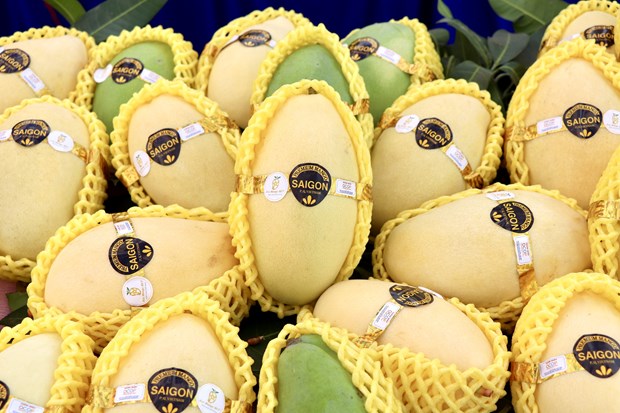 Economy
Economy

 |
| An Giang mangos are heading to more demanding markets. — VNA/VNS Photo |
AN GIANG — After nearly 10 years of negotiating, dozens of tonnes of Vietnamese mangos farmed in the Mekong Delta province of An Giang have been exported to Australia, the US and the Republic of Korea, which is a stepping stone for the product to enter more choosy markets.
With 70% of its area being alluvial land, An Giang has favourable conditions to promote agricultural industry, which is a key pillar in the local economic development.
Among major local agricultural products, mango has made great contributions to the growth of the province’s agricultural sector.
Currently, An Giang has 19,700 hectares of fruit farms, with nearly 12,633 hectares of mangos with an output of 225,000 tonnes per year. Major mango farming hubs of An Giang are Cho Moi district, with 6,400 hectares, and An Phu 1,800 hectares.
Nguyễn Sĩ Lam, Director of the provincial Department of Agriculture and Rural Development said that the province’s agricultural sector pledges to assist local businesses, organisations and farmers in building a stable material region and developing a sustainable value chain to serve exports.
The province will speed up the granting of codes for mango farming areas to increase export volume, according to Lam.
An Giang will call on businesses to link up together in producing and selling mangos, while encouraging farmers to engage in collective economy, enhancing the efficiency of mango farming cooperatives, especially those meeting GlobalGAP standards and operating effectively, he said.
The official underlined that the province will increase coordination between export processing facilities with cooperatives and cooperative groups to ship more processed products to choosy markets such as the US and Europe.
Meanwhile, Vice Chairman of the provincial People’s Committee Nguyễn Thị Minh Thuy said that the province will strengthen the application of science and technology in mango production, while renovating the production process towards safe, VietGAP and GlobalGAP standards, using biological, organic and microbial fertilisers.
Meanwhile, An Giang authorities will increase supervision and inspection to control pesticide residue on mangos, and develop more planting area codes, the official underscored, adding that the efforts aim to ensure quantity, quality, safety and traceability of mango products for export. — VNS




